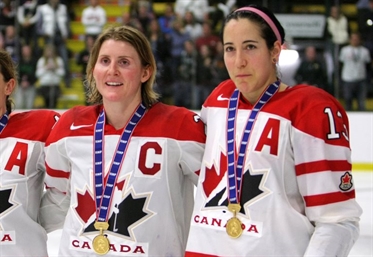Is Canada’s turmoil serious?
Is Canada’s turmoil serious?
Hayley out as captain after recent coaching change

 Surprising change: Haley Wickenheiser (left) loses the “C” to new captain Caroline Ouellette (right). Photo: Dave Sandford / HHOF-IIHF Images
Surprising change: Haley Wickenheiser (left) loses the “C” to new captain Caroline Ouellette (right). Photo: Dave Sandford / HHOF-IIHF Images
But for Team Canada’s women heading into Sochi, these are far from normal circumstances.
First, Dan Church resigned as head coach of the women’s national team on 12 December. Although there was shock at the suddenness and unexpectedness of the move, even that perhaps takes a back seat to events of 19 January when Hayley Wickenheiser was not named team captain.
She has worn the “C” for every major competition since Cassie Campbell retired in 2006, but now Wickenheiser has been replaced by another veteran, Caroline Ouellette.
What gives with the mighty Canadians?
Church’s resignation came to the surprise of every hockey fan in the country. He left, after all, with only 58 days until the opening faceoff of Canada’s first game of the 2014 Olympics.
Teams change coaches all the time, so the problem wasn’t with him resigning necessarily – it was the timing. More telling, he left with heavy heart, suggesting he was pushed out the door. By management? By players? Doesn’t much matter.
Church’s words were evocative: “If there isn’t confidence in what I’m doing, I need to step aside and let the team move on. I’m heartbroken, to be honest, about the whole situation.”
Canada’s coaching has been tenuous since Vancouver four years ago. Davidson herself was behind the bench for the monumental 2-0 win against the U.S. in the gold-medal game, but she ceded the bench soon after to become general manager and hired Ryan Walter as coach. A loss to the Americans at the 2011 Women’s Worlds spelled the end for Walter, and in came Church.
Continue readingUnder his watch, the team rebounded with an impressive win in Burlington, Vermont, but then fell again, in Ottawa. One would think any discomfort with him as coach would have been dealt with long before the final preparations for Sochi, but such was not the case.
Church’s most public move was cutting 28-year-old Tessa Bonhomme from the Sochi team, but that decision hardly seems to have been the cause of any friction between management, himself, and players. And it pales in comparison to Ouellette replacing Wickenheiser as captain.
Five days after Church resigned, and 53 days until that first Olympic game, Kevin Dineen was hired by Davidson. It marked as tumultuous a period in Canada’s women’s program since coach Shannon Miller cut Angela James just before the Nagano Olympics. And everyone knows what happened there.
“This has been a whirlwind few days, but when this opportunity presented itself, I immediately jumped at it,” Dineen said. To the negative, Dineen has no experience coaching women, but, as he said right off the bat, “I am a product of Hockey Canada.”
Be that as it may, Dineen has yet to win a meaningful game as coach. In three final tune-ups against the U.S., Canada lost 4-1, 3-2, and 3-2, close games all, but losses all. In games against boys’ teams and other exhibition opponents, the team is 0-5. In other words, Dineen is winless behind Canada’s bench.
Wickenheiser’s losing the “C” is nothing short of perplexing, though.
“I guess I’d be lying if I said it didn’t hurt,” she admitted. “At the same time, sometimes you can lead from different areas. If it’s a better decision for the team and gives us a better chance to win a gold medal, then that’s what we have to do. Obviously it’s disappointing not to be able to wear the “C,” but at the same time I think it gives our team a different dynamic and maybe something we need going into Sochi in order to get everybody going in the right direction,” Wickenheiser added, taking the high road.
The decision to make the change seems to be all Dineen’s, but the message is unclear. Is he blaming lack of leadership for the team’s poor record of recent weeks? It certainly caught incoming captain Ouellette off-guard.
“I was very surprised,” Ouellette confessed. “We didn’t know what was going to happen. Kevin came in recently. I think he wanted to see how the team was doing before he made his decision. I think we have a dozen players who are captains within their own teams. We have so many great leaders. I think it could have been many of us. I’m very honoured.”
Dineen explained his decision without saying too much.
“My feeling was with the dynamics with this group that Caroline would do a great job of leading it,” he offered. “It’s a tough decision because there’s excellent options out there. I think [Caroline] has got great respect throughout the game of hockey. Her practice habits for one are second to none as well as the way she plays the game. She’s a gamer. She has obviously a lot of respect in the room, which is an important part of leadership. But I look at leadership as plural. It’s not singular. We’re going to need everybody pulling in the same direction…I felt that the best fit would be maybe a little change in dynamics and that was thinking in terms of making the decision.”
One thing is for sure. If Church’s departure was what the team needed, Dineen’s bold move will be hailed as a key to winning gold – or a main reason for not winning.
If there is a problem with Canada heading to Sochi, however, it isn’t Church’s personality or Wickenheiser’s leadership. It is, more simply, the lack of turnover in the lineup. Some 12 of the 20 players heading to Sochi (not including third goalie Geneviève Lacasse) played at Vancouver four years ago and half of that number played eight years ago in Turin.
While Canada has dominated at the Olympics, winning in 2002, 2006, and 2010 after losing in 1998, its rate of success has dropped significantly at the Women’s Worlds where it has won gold only twice in the last seven events going back to 2005.
Of course, if you have great players, it’s difficult to cut them simply because they’ve been around a long time. But if you don’t bring young players into the system, you risk losing a generation of talent to the international arena. Consider coach Katey Stone and her Americans, who showed at the 2013 Worlds that they were younger, faster, and hungrier for the win.
The Olympic format follows the recent Worlds format of having the top four teams in one pool and the 5-8 ranked teams in another. This means Canada will face the U.S. possibly twice – once, for sure, in the preliminary round robin, and again in a potential gold-medal clash. (Finland and Switzerland are the other teams in Group A.)
Projected Result:
Although some European countries have made advances and have crowded the competition for the bronze medal, it still feels that the race for gold is mainly between Canada and the United States. However, the Americans must certainly be considered favourites heading to Sochi. As of now, internal upheaval and American improvement spell silver for Canada in Sochi.
Three Stars:
If Canada is to win, it will need a great goaltending performance from Shannon Szabados, who was brilliant in that 2010 victory.
As well, Marie-Philip Poulin, who scored the only two goals in that game four years ago and who is still only 22 years old, must be a leader on offence.
Lastly, this must be the moment for Rebecca Johnston to step up and lead in a way she has indicated she is capable of doing.
Dark Horses:
The two youngest players on the team are both forwards – Melodie Daoust, who just turned 22, and Brianne Jenner, also 22. Daoust played at the 2009 and 2010 WW18 and has now progressed to the big team while Jenner, despite her youth, played at the 2012 and 2013 Women’s Worlds. Canada needs these young players to step up and contribute on a team that is generally older and slower than the Americans.
Back to Overview







































